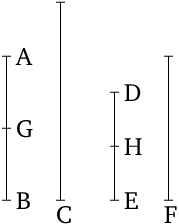Proposition: 7.06: Division with Quotient and Remainder Obeys Distributive Law (Sum)
(Proposition 6 from Book 7 of Euclid's “Elements”)
If a number is parts of a number, and another (number) is the same parts of another, then the sum (of the leading numbers) will also be the same parts of the sum (of the following numbers) that one (number) is of another.
- For let a number $AB$ be parts of a number $C$, and another (number) $DE$ (be) the same parts of another (number) $F$ that $AB$ (is) of $C$.
- I say that the sum $AB$, $DE$ is also the same parts of the sum $C$, $F$ that $AB$ (is) of $C$.

Modern Formulation
See divisibility law no. 9.
Notes
This proposition states (for integers $0 < r_0 < AG$ and $0 < r_1 < DH$)
$$\begin{array}{rclclc}C&=&AB+r_0&=&n\cdot AG+r_0&\wedge\\
F&=&DE+r_1&=&n\cdot DH+r_1\\
&\Downarrow&\\
C+F&=&(AB+DE)+(r_0+r_1)&=&n(AG+DH)+(r_0+r_1)
\end{array}$$
with $0 < (r_0+r_1) < (AG+DH).$ In particular,
$$n\not\mid (C+F)\Rightarrow n\not\mid C\vee n\not\mid F.$$
Table of Contents
Proofs: 1
Mentioned in:
Proofs: 1 2 3
Thank you to the contributors under CC BY-SA 4.0! 

- Github:
-

- non-Github:
- @Fitzpatrick
References
Adapted from (subject to copyright, with kind permission)
- Fitzpatrick, Richard: Euclid's "Elements of Geometry"
Adapted from CC BY-SA 3.0 Sources:
- Prime.mover and others: "Pr∞fWiki", https://proofwiki.org/wiki/Main_Page, 2016
